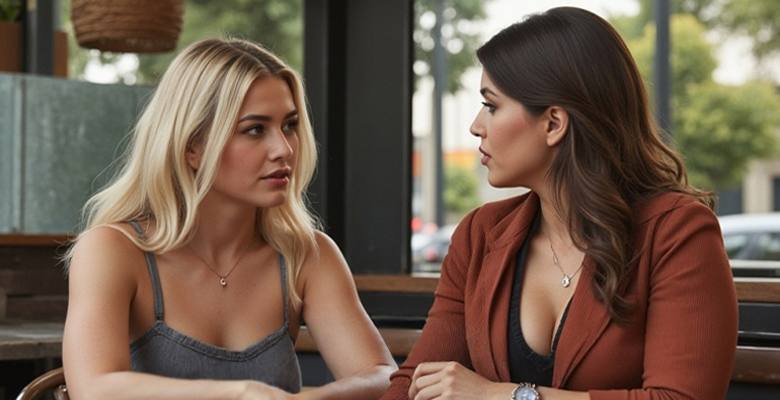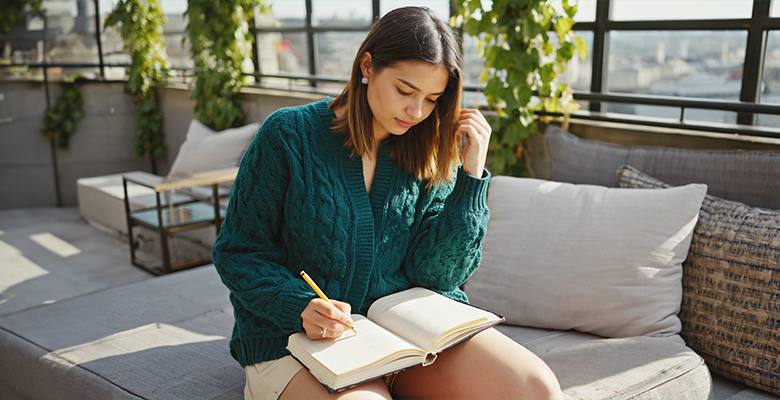Sign up
Am I Bisexual or Lesbian: Introduction to Clarity
Knowing your vibe is key. Am I bisexual or lesbian? This matters. A 2022 Gallup poll says 7.2% of U.S. adults ID as LGBT. Bisexual gals make up 58.2% of them. Pinpoint where you fit in. Like both or just gals? Dig into feelings, see where you stand. Labels help some folks vibe better with themselves. Grab a moment alone, ask yourself. The web's got quizzes and chats to try too. Understanding who you dig romantically kicks off self-awareness. Knowing makes choices easier. Knowledge is power right in this scene. Clear your mind, find answers, make it match reality.

What is Bisexuality?
Bisexuality means being into more than one gender. This attraction can vary in intensity and may change over time. Some folks ask, “am I bisexual?” if they're attracted to different genders. It's a real and true sexual vibe, not just a stop on the way to something else. Common myths suggest that bisexuality is a temporary phase or a sign of confusion. These myths have been shot down by scientific research, which shows that bisexuality is a stable sexual orientation. When asking if one is “bi or lesbian,” know that bisexuality sticks. It's a valid way of feeling and is recognized within the LGBTQ+ community. People who identify as bisexual may experience unique challenges due to stereotypes, but their identity is just as legitimate and real. Understanding bisexuality can help diminish the stigma associated with it. Awareness can foster acceptance and appreciation of varied sexual orientations. Open discussions about bisexuality can combat stereotypes and isolate misinformation. With greater visibility, bisexual voices contribute to broader conversations about equality, diversity, and inclusion. Education and support networks are essential for those questioning their sexuality. Acceptance from family, friends, and peers plays a crucial role in the mental wellbeing of bisexual people
What is Lesbian Identity?
Lesbian identity is all about being into women. It's a romantic and sexual vibe exclusive to gals. Simple as that. This identity ain't a mix or half-baked. It's distinct and genuine. It's valid. No need to get confused with bi vs lesbian. Just because you like women, that doesn't mean it's hard to know how to know if you're lesbian.
Wondering about lesbian identity? Here's a start:
- Romantic attraction to women only.
- Sexual attraction to women only.
- Emotional connections mainly with women.
- Desire for long-term relationships with women.
If your heart and mind always scream "women," then that might be your vibe. Clear the doubts. The lesbian identity stands strong, stands clear. It's all about who gets your heart beating. Feelings can be complex, but identifying as lesbian can bring clarity and understanding. Bi vs lesbian matters when figuring out your feelings. You decide. You feel that. Get to know how to know if you're lesbian. It's cool to figure things out. Explore your emotions. Ask yourself, “Do women make my world?” Engage with communities and stories that resonate. Be honest with what brings you joy and fulfillment. Remember, every step in understanding is valid
Sexual Orientation as a Spectrum
Ever thought, "am I bi or lesbian?" It's good to know that sexual orientation isn't just black and white. It's more like a spectrum. This means attractions can be fluid and might change over time. Think it over. You're not stuck. Studies show sexual orientation identities can change across a 10-year period, allowing for growth and self-discovery. This means one's vibe in attraction can shift. It's normal. Some feel attracted to different genders at different life stages, while others might not feel a strong attraction to any gender. Experiences like these are all valid within the spectrum, reflecting the diversity of human experiences. Understanding that orientation can evolve provides comfort and relief to many.
Queer identities are part of this spectrum. You don't have to box yourself in too soon. Feelings can mix, change, and that's okay. Openness to growth in identity can lead to a true sense of self and a deeper understanding of personal desires. Explore relationships and attractions at your own pace. Let the experience teach you something new. Each relationship can reveal different aspects of your preferences. Engage with a variety of cultures and viewpoints to broaden your understanding. Keep stuff simple, stay curious, and be yourself. Engaging with supportive communities can also encourage personal discovery and authenticity. Connect with others who have similar experiences, and find resources that can offer guidance. Online forums, local LGBTQ+ groups, and counseling services are accessible options. Shared stories from others can offer insight and reassurance. Knowing you are not alone can be empowering and freeing, giving you the confidence to embrace your unique path.
How to Tell if You're Bisexual
"Am I bi or a lesbian?" You are not alone here. Here are some hints to know if you're bi. First, you feel attraction to more than one gender. Simple. You look at that cute guy and bam, feel the same vibe with a gal later. This might be you, bi. Check these other signs:
- You often fantasize about different genders. It's like, all the time. You find yourself daydreaming about romantic or intimate scenarios involving people of varying genders.
- You date guys and girls. It's day-to-day stuff for you. You fall for personality, not what's on the outside. You don't limit yourself to specific gender-based expectations in relationships.
- Your convos with bi or lesbian buddies feel relatable. They totally get you. Sharing experiences and feelings with them often helps you feel validated and understood.
- You ask yourself, "Am I bi or a lesbian?" often. This question pops up a lot. Exploring your identity is part of your quest, reflecting a continual self-discovery process.
Folks chat about this often on the scene. That's cool. It's not just you. Take it from many out there, having the bi or lesbian tags is totally chill. Real talk. No need to stress, follow the vibes of attraction, whatever it feels like. However, it can be beneficial to explore discussions in online forums or join support groups to gain more insights.

How to Tell if You're Lesbian
Wondering if you're lesbian? Look for signs. First, check your attraction vibes. If you're only into women, that's a strong hint. Am I bi or lesbian? If gals are all that, it's pointing to lesbian.
Then, think about your past crushes. Were they always on chicks? All those school days, posters on your wall-spotted any pattern? Exclusive attraction can be a sign. If you fantasized mostly or solely about women, that's another clue. Personal daydreams and romantic feelings offer valuable insight.
Got friends with their own stories? They might help. Sharing stories with those who asked, am I bi or lesbian? can bring some clarity. You're not alone in this space. Friends might share their own "aha" moments and realizations. Listening can shed light on what you're going through.
Next, try dating scenes. Notice what feels right. Bi vs lesbian: who do you vibe more with? That kinda stuff can point to your identity. Consider if emotional connections are stronger with women; chemistry isn't just physical. Real-life experiences often help in making things clearer.
Hormones mess around in your teens. It's not always clear-cut then. As you grow, your feelings get real. That's when exclusivity matters. Self-reflection at different life stages can clarify your attraction. Awareness may evolve over time as you gather life experiences.
Lastly, talk to people. Join cool online link-ups, like Lesbiemates. Gals there explore the same questions. There's comfort in numbers. So, chill, get answers and feel your identity better. Community support and shared stories can offer guidance, reassurance, and a sense of belonging.
Common Myths and Misconceptions
Busting myths? Essential stuff. One popular misconception: Bisexuality is just a phase. Nah, it's not. Research shows that's old news. People got it wrong. Bisexual and lesbian identities are real. They're not a vibe you outgrow. Studies from reputable organizations confirm these identities are stable and enduring.
Fact is, bisexual folks might date guys or women. It's about attraction to both. Doesn't mean they're in between. Just means they're open to more. It's true, not a hustle. Lesbians, on the other hand, are into women only. It's a different tune. Both legit. Bisexuality can sometimes be misunderstood as indecisiveness, which is simply inaccurate.
Don't mix them up. Both identities face unique challenges. Bisexuals might encounter skepticism from both straight and gay communities, while lesbians may face scrutiny within their own community regarding gender norms. Both deserve respect. Labels can often be limiting, and respecting self-identification is crucial. We ain't here to label anyone. It's about understanding, not boxing folks up. Get it?
Understanding the complexities of these identities helps in nurturing supportive environments. Awareness and education can reduce stigma and promote a more inclusive society. By embracing diversity, we ensure that everyone feels seen and heard. Open dialogue is key. Listening to experiences can foster empathy and acceptance. Schools and workplaces can contribute by offering training that highlights these experiences.
The Role of Society and Culture
Society and culture profoundly affect how people perceive bisexual and lesbian identities. Discussions about being bi versus lesbian frequently surface. The media plays a crucial role in this discourse. Movies and television shows shape societal views. Some portray these identities accurately, while others distort them, leading to misconceptions.
Cultural norms often reinforce stereotypes. For example, bisexual women are sometimes unfairly labeled as unfaithful or confused. These stereotypes complicate the internal dialogue for those asking themselves, "Am I bisexual or lesbian?" Addressing this question requires genuine conversation, free from myths. These societal influences affect anyone questioning their sexual identity.
Proper representation is vital. Seeing varied narratives on screen can help people feel validated and understood. Conversely, a lack of representation can create barriers to identity connection. Society should support all sexual orientations and identities to foster acceptance and understanding. Recognition and acceptance of varied identities are necessary for promoting an inclusive atmosphere.
In-depth discussion about bisexual and lesbian experiences remains uncommon. Media must strive to be more inclusive by showcasing a wide range of experiences. This broadened portrayal can help the public develop a nuanced understanding of these identities. Therefore, honest and varied representation is imperative.
Embracing elements that make each identity distinct is crucial for anyone exploring their identity. This process significantly impacts how people self-identify, often with profound effects on their personal lives and interactions with others.

How to Explore and Reflect on Your Sexuality
Feeling lost on this? Chill, it's normal. First step, think about journaling. Write stuff down. Thoughts, feelings, and any signs of bisexuality. Make it a habit. Reading back on past entries can also help spot patterns or changes over time. Journaling can be therapeutic and offers personal insight.
Next, try open convos. Chat with folks you trust. It helps to hear different views. But pick those who won't judge. Sharing experiences and listening to others can be uplifting. It can really boost your vibe. Online communities or support groups are also great spaces to find understanding voices.
Be easy on yourself. This ain't a rush. Need patience and self-compassion? Yeah, trust me, it's important. Pressure won't do you any favors. Accept that your quest is unique. Celebrate small steps and learn from missteps. Growth often comes from moments of uncertainty.
Look for signs of bisexuality. Attraction to more than one gender? Pay attention to these feelings. They're real and give clues. Question why certain people make you feel drawn to them. Exploring your preferences can lead to a clearer understanding of your identity.
Remember, figuring things out takes time. Be chill about it. No need to stress. The right answer comes when it wants to. Everyone's path is different, and what's most important is that you find authenticity in your own time and way.
Finding Your Community and Support
Connecting with LGBTQ+ folks is key. Why? You get support. You find people like you. It's comforting. Start with local meetups or online groups. Many cities have LGBTQ+ community centers offering events and resources tailored to help people explore their identities. These centers often have professionals skilled at guiding newcomers in understanding their sexual orientation and gender identity.
According to a 2021 report, around 3.3% of the UK population is into identifying as lesbian, gay, or bisexual. That's a lot of people. You're not alone in asking, "am I bi or lesbian?" Such communities often host workshops and discussions, providing safe spaces to explore these questions. Participants often share personal stories and experiences, which can be enlightening and reassuring.
These meetups help you find your Lesbian identity. Asking questions and sharing feels good. You meet real people who understand your vibe. Online platforms like forums and social media groups also offer anonymity, which might feel safer initially. There are specialized forums for various identities, allowing people to find the specific support they need. More support equals more comfort in self-discovery, leading to healthier mental well-being and increased self-acceptance.
Understanding Sexual Orientation
Figuring out whether you are bi or lesbian? It's normal. Lots of folks question their vibe. Being into gals or both, it's personal. No hurry. Take time to understand your emotions. Chill and think about who makes your heart race. Trust your gut. You know, the typical hookup? Not your thing if you're lesbian. That's a sign. Or, maybe you're game for both worlds. That's being bi. Just remember, it's perfectly fine to explore your feelings and preferences over time until you feel comfortable with your identity.
How to Know If You're Lesbian
How to know if you're lesbian? Focus on feelings. Like, who you crush on more. If only on gals, then maybe that's it. Sometimes it takes time. Try not to stress. Keep an open mind. Exploring relationships and noting what feels right can guide you in understanding your orientation. Seek out conversations with those who have been through similar experiences for support; it can help clarify thoughts. It's your thing, nobody else's.
Conclusion: Accepting Yourself
In the end, chill and be you. Own who you are. Whether you're bi or lesbian, it's all cool. Confidence is key. Engage with supportive communities to gain confidence. Don't let doubt mess with your headspace. Be true. Share your quest when you're ready. You got this.